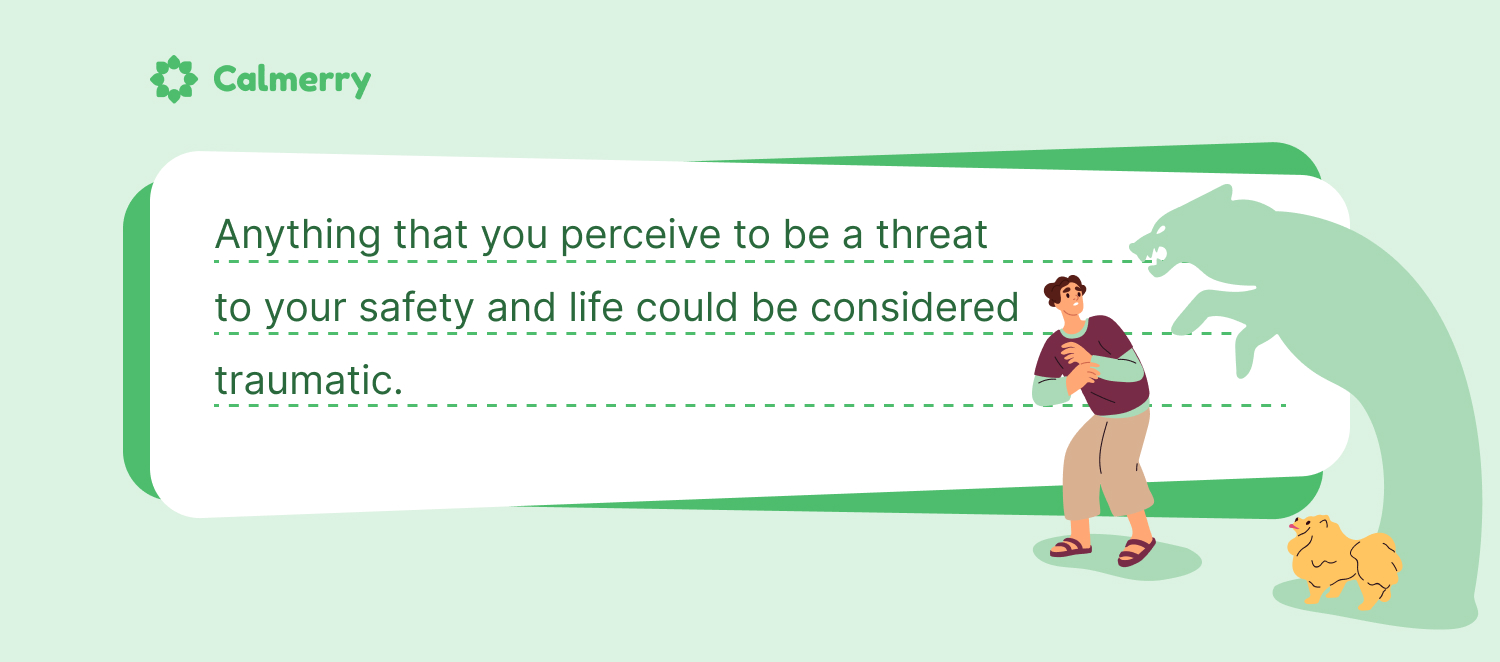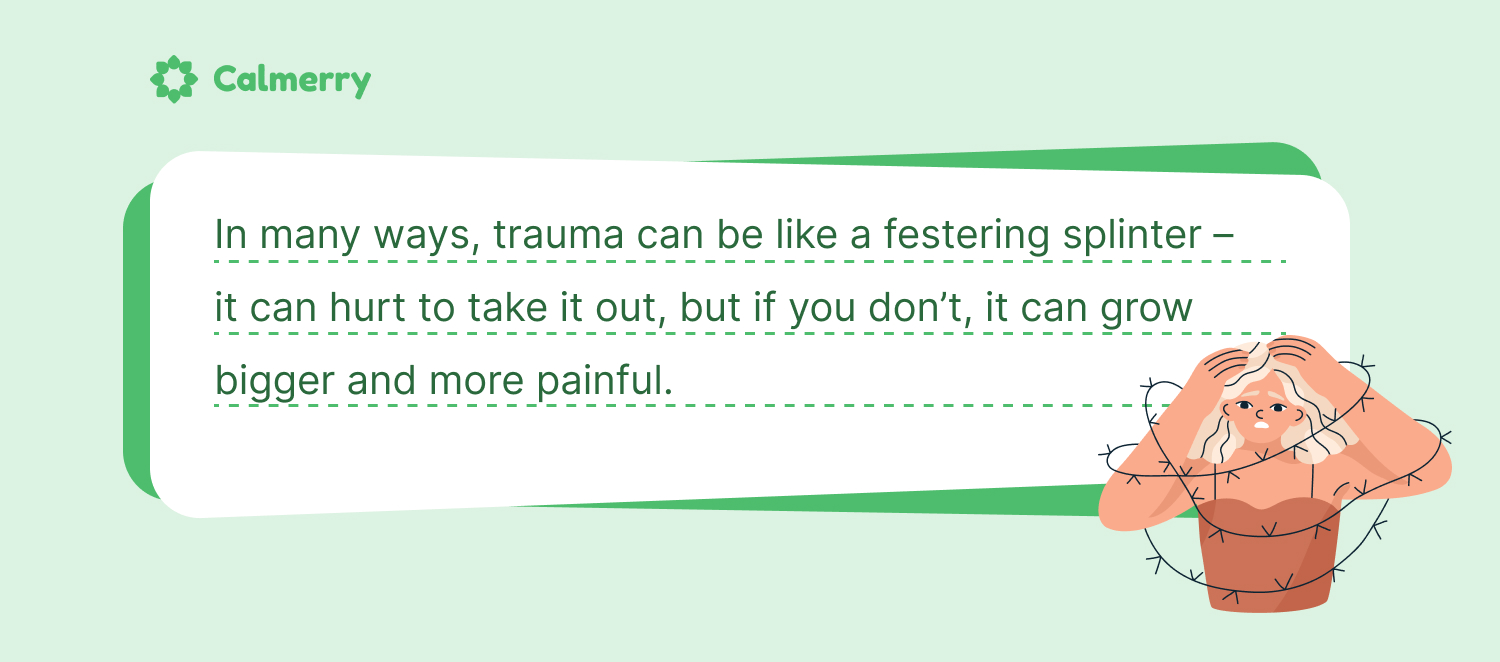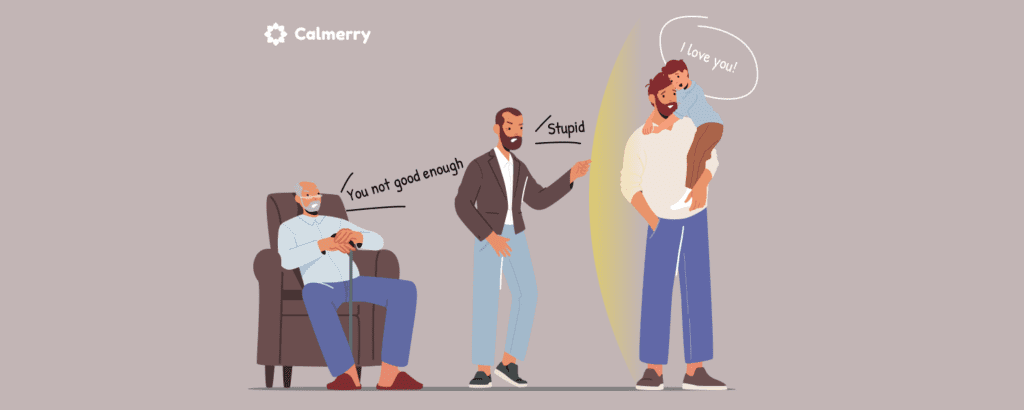Trauma Therapy: Types of Trauma-Specific Treatments

In this article
Unfortunately, trauma is more common than you might believe. Up to 70% of people will experience at least one traumatic event in their lifetime. Although trauma affects people in different ways, many people develop more serious mental health symptoms after experiencing a traumatic event.
But there is hope for recovery; the trauma that you’ve been through doesn’t have to affect you forever. With the support of a trauma therapist, you can heal from what happened to you and learn how to trust the world again.
What is trauma?
The term trauma refers to the emotional reaction that we have after going through a terrifying or life-threatening experience. Examples of events that can be traumatic include:
- Being a victim of physical or sexual assault
- Childhood abuse (physical, sexual, or emotional)
- Intimate partner abuse
- Witnessing violence or a death
- Facing racism and institutional violence
- Natural disaster
- War (living in a warzone or fighting in a war)
- Gang violence or other types of community violence
- Serious accident (like a car accident)
- Serious medical procedures and illness, including surgeries
- School violence
- Religious trauma
- Forced migration or displacement
- System-induced trauma, like a child being forcibly removed from their home or incarceration/police violence
- Certain types of loss and separation
This isn’t an exhaustive list; anything you perceive to be a threat to your safety and life could be considered traumatic.

It’s important to note that trauma is not pathological in and of itself. In other words, it’s normal to have an emotional reaction after going through experiences like these. These events are terrifying to live through, and it’s perfectly natural for your body and mind to react.
Some people who’ve experienced trauma develop symptoms of post-traumatic stress, or PTSD. For example, they may be hypervigilant (constantly monitoring their surroundings) and startle easily. They may have nightmares or flashbacks about the traumatic event. They could go to great lengths to avoid any places, people, or things that remind them of what happened.
You can check your symptoms online. But please note that online screening tools are not diagnostic instruments. Talk to a licensed provider who can conduct a full assessment and give you more insights into your symptoms and experiences.
There is a wide range of reactions people can have to traumatic experiences. Some people may seemingly forget about the event in just a few months, while others struggle with PTSD for years. Any reaction you have to trauma is okay.
What is trauma therapy?
Trauma therapy refers to any type of psychotherapeutic treatment that addresses traumatic experiences and post-traumatic stress. There are many specific types of therapy to address trauma, and “trauma therapy” is simply an umbrella term that includes all of them.
No matter how you’ve reacted to the traumatic event, you could benefit from trauma therapy. Using various methods, trauma therapists help their clients process what happened and find healthy ways to move forward.
Trauma therapists can help you:
- Understand what happened and how it affected you
- Reframe the traumatic experience
- Address the psychological and emotional harm that came from the trauma
- Work on changing dysfunctional beliefs that may have arisen from or about the trauma (like “it was my fault”)
- Find new meaning and hope in life after the trauma
- Learn coping skills to manage symptoms like hypervigilance
How does trauma therapy work?
Different types of trauma therapy work in different ways. What all of them have in common is that they work by supporting you in addressing the traumatic event head-on.
People who’ve gone through a traumatic event are usually experts in avoiding the memory of what happened. Trauma therapists encourage you to directly face what happened – of course, with their support – and reframe it to find resilience and meaning.
Some types of trauma therapy will do this through traditional talk therapy methods, while others may use more innovative technology and methods.
Do I need trauma therapy?
Anyone who has been through a traumatic event can benefit from trauma therapy. But, again, people have a wide range of reactions to traumatic experiences. Trauma therapy may be especially beneficial for you if your trauma symptoms have affected you in your daily life.
- Do you find yourself thinking about the trauma you’ve been through often – or, on the contrary, doing anything you can to not think about it?
- Do you have frequent mood swings without knowing where they come from?
- Do you have a hard time trusting others in relationships?
- Do you blame yourself for what happened and feel overwhelmed with fear that it’ll happen again?
These are all signs that you may need trauma therapy.
You know yourself best – so you (along with other trusted people in your life) are the best judge of whether or not you need therapy to recover from trauma.
But keep in mind that trauma can continue to affect you, even if it’s been years (or even decades!) since the trauma originally happened. In many ways, trauma can be like a festering splinter – it can hurt to take it out, but if you don’t, it can grow bigger and more painful.

Types of trauma therapy
There are many types of therapy that can help you heal from trauma, and many are evidence-based. There isn’t one specific therapy that’s best for trauma, but there are some that research shows are more effective than others.
Here are some of the most effective types of trauma therapy, according to clinical research.
Prolonged exposure (PE)
PE is one the most effective forms of trauma therapy and is highly recommended for the treatment of PTSD by the APA. PE, along with other types of exposure therapy, are types of cognitive-behavioral therapy (CBT).
You’ve probably heard of exposure therapy for specific phobias – gradually confronting your fears until those fears are neutralized. PE is based on the same principles.
In PE, your therapist will encourage you to talk about and re-experience the trauma in a safe and controlled setting. For example, your therapist may guide you to talk about the details of what happened while controlling your breathing, or you might visit the scene together.
It sounds scary, but research shows that the more you expose yourself to these scary memories, the less severe your symptoms of PTSD will become. On the flip side, by avoiding these memories, you rob yourself of the chance to recover.
The benefits of PE can last long after your final session.
Cognitive processing therapy (CPT)
CPT is another form of cognitive-behavioral therapy designed to help people heal from trauma.
In CPT, your therapist will help you identify and challenge dysfunctional beliefs that you may have developed as a result of the traumatic experience. For example, someone who was abused as a child may have beliefs like “I am unlovable” or “I deserved it.” The CPT therapist will help you bring these beliefs to the surface and work on modifying them to be healthier and more accurate.
One study found that CPT was just as effective as prolonged exposure in treating symptoms of PTSD.
Eye movement desensitization and reprocessing (EMDR)
EMDR is very different from other types of trauma therapy in that it’s not talk therapy. In EMDR, your therapist will guide you to make bilateral eye movements as you talk or think about the trauma.
They may ask you to follow their hand (moving from left to right) with your eyes. Others use electronic devices or rhythmic tapping to get the bilateral movement effect.
Although researchers are still trying to figure out the exact mechanics of how it works, evidence shows that EMDR can help you process traumatic memories (even buried ones) and find relief from PTSD symptoms.
It may sound like something out of a science fiction novel, but research shows that it’s extremely effective – one randomized controlled trial found that EMDR is just as effective as CBT when it comes to trauma.
Other types of trauma therapy, like trauma-focused cognitive behavioral therapy and trauma systems therapy, are used for children and teens who’ve been through trauma.
What to look for in a trauma therapist
Many therapists claim to be able to work with trauma, but there are some “green flags” you should watch out for when choosing a trauma therapist.
Look for a therapist who:
- Truly specializes in trauma and can show you the experience and training to back this claim up
- Makes you feel safe and accepted
- Is trained and experienced in one of the recommended trauma therapies listed by the APA
- Has trained in a setting that’s specific to treating trauma, such as a sexual assault treatment center, refugee shelter, or emergency room
- Has experience with the specific type of trauma that you’ve gone through
- Uses treatment methods that are specifically designed for trauma, rather than more general treatment methods like “CBT” (vs. a specific type of CBT for trauma like prolonged exposure)
- Can accommodate your needs and schedule
At Calmerry, we have over 600 licensed mental health therapists on our team, many of whom specialize in helping people heal from trauma. Our therapists are trained in evidence-based treatment methods like the ones above and provide you with the best trauma care available. Best of all, you can meet with your online therapist from the comfort of your own home.
Learn more about our program or sign up today.
Frequently Asked Questions
Still have questions? We’ve got you covered.
How to talk about trauma in therapy?
If you’re already in therapy, knowing how to bring up your trauma background for the first time can be tricky.
First of all, you should only talk about trauma when you feel safe enough with your therapist. Talking about it before you’re ready could do more harm than good.
Even though it’s scary to talk to your therapist about trauma, try to keep in mind they are there to support you, not judge you. If you don’t know what to say, try this: “There is something that I’ve been wanting to tell you about. I’ve experienced some things in my past that I believe continue to affect me today. I am hoping we could set aside some time today to talk about it.”
There is no right or wrong way to bring this up, and you should feel free to talk about it in a way that feels comfortable for you.
How to process trauma in therapy?
Processing trauma in therapy isn’t something you need to figure out how to do on your own. Your therapist will guide you through this by asking certain questions or inviting you to reflect on certain aspects of what happened.
The most important thing that you can do to help yourself process trauma is to be honest with both your therapist and yourself. It can be terrifying to confront and process trauma, but avoidance takes you further and further away from healing.
If you’re ever feeling uncomfortable or unsafe, communicate that to your therapist.
Should I see a therapist for childhood trauma?
Abuse and other types of childhood trauma – sometimes called developmental trauma – can show up differently than other types of traumatic events. That’s because childhood trauma isn’t just a one-time event – it happens over a long period of time, usually at an age when the brain is developing. This can deeply affect a child’s attachment and growth.
Trauma therapy can certainly help for childhood trauma, and there are many types of trauma therapy specifically designed for children and teens.
Developmental trauma may have also led to other mental health conditions like depression or self-harm. In these cases, you may want to consider seeing a therapist that can specifically help you recover from these concerns.
online therapy
live video session


